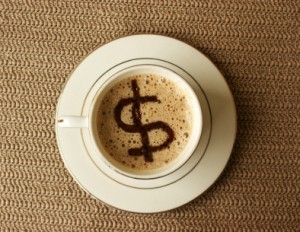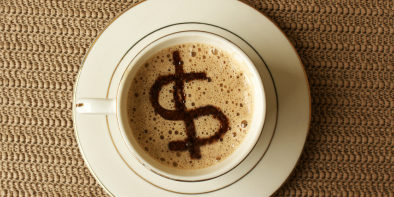 The price of coffee hit an all-time high two years ago in May.
The price of coffee hit an all-time high two years ago in May.
Since then, the price has continued to drop, even hitting a four year low of $1.15 per pound.
If all that is expected to continue, why are loyal coffee fans still feeling the heat at cafe cash registers?
One of the main reasons? Disposable income.
Consumers who frequent coffee shops like Starbucks, Seattle’s Best, Caribou, etc. tend to be middle to upper income earning households. Buying a custom coffee everyday is termed an “affordable luxury” meaning a few bucks a day allows us a glimpse into how the elite live.
There’s also the factor that having a drink, or frequenting Starbucks has a certain social status associated with it. Whether in a cup holder or on their desks, people want to be seen drinking from a branded cup, not that dirty mug at the office that gets washed (maybe) once a month.
The problem with that trend is companies like Starbucks and Green Mountain Coffee are bringing in hefty profits, as the price of coffee continues to decline but the actual finished good price scales upward.
And who blames them?
They’re providing a service that millions of people are willing to pay for. A literal example of the free market system at work.
No judgment being passed here, but take a step back and consider the situation if your monthly budget buys you less and less.
Personally, I’ve switched to brewing at home, buying bags of premium coffee and hanging out with Mr. Coffee. Sure it still leads to profits for the big boys, but it beats the heck out of eight dollars plus a day for a Soy Cinnamon Dolce Latte which has become more a ritual than a pleasure.
If however you’re fine with paying the “trendy” coffee shops to do it for you, and don’t mind them NOT adjusting prices that would benefit you, by all means that is your right as a consumer. Continue sipping as usual.
Maybe you can skip tipping your barista though, and suggest they take the issue to corporate asking Mr. Schultz to pony up a bit of his bonus.
Just a thought.








Something you may not know about baristas’ tips: When they drop a lot, the manager gets upset. Not because the manager gets tips, but because tips are an indication of how well the store is doing. It’s not official or anything but it is definitely something management looks at. Lower tips mean that the baristas are doing something wrong. When people stop tipping because prices are so high, or because they don’t carry cash anymore because they pay with their cards exclusively, the tips drop, and management freaks because they think, what are my baristas doing wrong?! Even though the answer is absolutely nothing.
Just a thought.
maybe you shouldn’t take things out on people who make minimum wage and don’t have a direct connection to a CEO, just a thought.
But is it our responsibility to both line the company’s pockets AND make sure the employees are fairly compensated by picking up the slack?
I see your point, but as prices keep going up, consumers will seek new alternatives, leaving the barista’s out of luck anyway, unless of course loyal customers brew coffee at home and drop off a buck or two when they’re in the area.
As a Barista for Starbucks in the NY Metro area, It is worth noting that our standard coffees are not that much more than competitors such as Dunkin Donuts, Tim Hortons, etc. The price skyrockets when you start purchasing the espresso drinks with a bunch of different syrups, milk, and all sorts of modifiers that contribute to labor and material costs.
As I write this, in New York City, a small coffee or iced tea is $1.91, and a small latte or cappuccino is $3.43, all after tax.
A Venti, or Large, Cinnamon Dolce Latte with Soy milk is closer to the $6 or $7 dollars alluded to in the article. To actually push the drink past the $8 threshold, you would have to start including other modifiers, such as Caramel Drizzle (an extra $.60) and different syrups like mocha and pumpkin spice (but at that point it just starts tasting terrible, and what’s the point of that?). You also pay an additional $.60 for each additional shot of espresso that gets poured in.
In addition to labor costs, Starbucks is also one of the few companies that offers some pretty comprehensive health plans (before the Affordable Care Act was even pushed through), along with initiatives for education, 401k and stock options, and sick leave.
Does this justify the costs of the coffee that Starbucks serves? As somebody who is seeing things from behind the counter, and who has actually seen where the money paid for what we serve goes, I answer strongly in the affirmative.
Alright listen here you moron. Why the hell are you blaming the barista on corporate coffee pricing? Im a barista at starbucks and what makes you think that in any way that I have control on prices? Screw you saying “skip tipping your barista” to help stick it to the man so you can get your fucking privileged cinnamon dolce latte for a few cents cheaper. And did you ever consider milk prices in your great economic wisdom? Or the cost of paper/plastic for the cups? No! Im glad you’ve decided to stick to brewing your coffee at home because you honestly sound like the kind of person who orders their drink and then demands it to be remade because the foam to froth ratio was off. Whatever the hell that means! I hope no one reads this stupid article because it is honestly some of the most uneducated garbage I have ever read.
@Barista
I appreciate the well thought out reply, and I apologize to you, and other level-headed baristas, for my sarcastic final comment.
Based on the cost of materials, like say soy milk, there’s an $0.80 flat charge for it, whether getting a tall, venti, or heck, even a splash of it in your iced coffee instead of cream. Starbucks is covering their costs easily and then some, considering the retail carton of soy milk goes for around $4, but I’m sure Starbucks is getting it in bulk for much cheaper.
It’s the free market though, and if consumers are still buying even if your costs of materials are going down, why wouldn’t you charge a price deemed fair by the market?
We, on this end, just found the info interesting, especially as some of us have turned to brewing at home, partly because of the cost, but mainly due to the fact that the enjoyment wasn’t there anymore, and we were paying $5-10 day after day on something that was more a habit than a luxury.
http://data.bls.gov/cgi-bin/surveymost
Milk prices haven’t been this high since 2007/2008. The last Starbucks price hike before 6 months ago was about 3 years ago. Considering recent increases in inflation, milk and gas prices (delivery costs for ALL products). Espresso beverages (easily the largest portion of Starbucks’ revenue) are almost a complete even break (1-2% profit). Almost all of their profit is garnered from whole bean, brewed coffee, and retail. As an aside, since I’ve been working for the company starting August 14, 2006, I’ve seen one pound bag of coffee go from $9.95 to $11.95. Over a seven year span, is this really that much of an increase? What research are you going by? How much have you looked into the situation beyond just bean prices? Do you believe that fighting these price increases is best done by reducing the local baristas wage? Any other random thoughts and concerns are much appreciated.
@John
Again, we appreciate the thought and courtesy of your comment.
“Espresso beverages (easily the largest portion of Starbucks’ revenue) are almost a complete even break (1-2% profit).”
I find that hard to believe, but will wait for proof. Is there a source on this somewhere? (If it’s in the link you used I’m only seeing “currently unavailable” when I click.)
There’s no doubt in my mind that Starbucks isn’t covering their costs and then some. If they weren’t they wouldn’t be in the hurry they are to expand into emerging markets since they’ve more or less exhausted North America. (And please don’t use the “volume=profits” argument, because if that were true, at such low margins, we’d have grocery stores on every corner along with Starbucks.)
“Do you believe that fighting these price increases is best done by reducing the local baristas wage?”
Absolutely not. If Starbucks, Green Mountain, Seattle’s Best, etc. all reduced employees wages in an effort to lower consumer costs, there’d be HUGE trouble brewing.
The argument wasn’t even an argument, if you noticed I’ve said several times, if consumers continue to buy they need do nothing. This article was more or less just providing information that seemed interesting.
I am however getting tired of the “employees can’t change a company” argument. It’s a lame one, and if you’re working for a company, and personally I don’t think Starbucks is like this, that won’t listen to a general consensus from their employees (in general, not saying there’s one among baristas here regarding prices), then is that a company you want to support/work for?